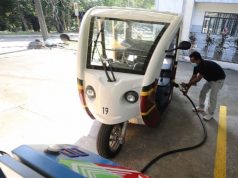The first car with a biocomposite body structure has been built by Eindhoven University of Technology students. Reuters’ Jim Drury reports.
TU/Ecomotive says ‘Lina’ is the world’s first car with a fully biocomposite body structure.
The 4-seat e-car’s chassis uses a combination of bio-composite and bio-plastic made from sugarbeet.
“It’s made of flax, the outside is made of flax fibres, together with polypropylene. It’s pressed and heated to make flat panels. In the middle you can see polylactic acid, the honeycomb structure of that material, which adds to the strength and weight savings of the sandwich panel. All structural parts of the car are made of this material,” Yanic Van Riel, TU/Ecomotive, saying.
The biocomposite has a similar strength-weight ratio to fibreglass, making the car light, greatly reducing battery size.
“The car weighs only 310 kilograms which is really light for a car. That’s why we only need 30 kilograms of batteries. And on those 30 kilograms of battery packs we can drive around 100 kilometres, which is about four times more efficient than a BMW i3 right now and that’s in real city driving, so braking, stopping, accelerating, not just like the most optimal driving,” Noud Van de Gevel, TU/Ecomotive, saying.
Lina has a top speed of around 50 miles per hour. Electronic features include NFC – nearfield communication technology.
“We can open our doors with NFC technology and a car will immediately recognise who is driving it. So if I’m opening it, it will save all the data from me and if someone else opens it, it will save his data. In that way we can use this car for carsharing apps, which other companies are creating. Also we have a hood system which projects the speed and all the information of the car into the front window, so we can see it through the window and still see the road, so it’s more safe,” Gevel, saying.
The team hopes the prototype will soon be declared roadworthy, allowing it to be tested on Eindhoven city streets.









